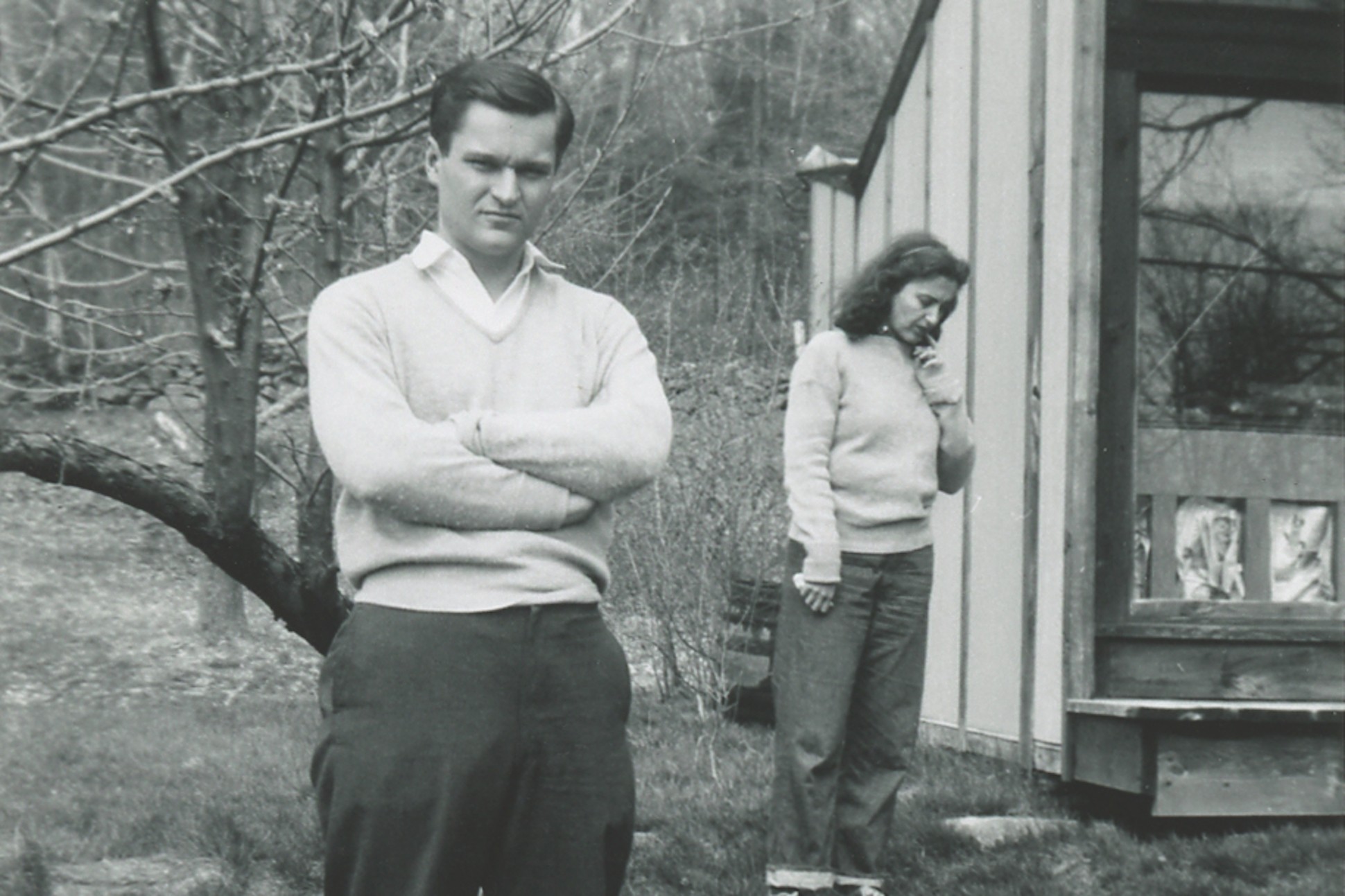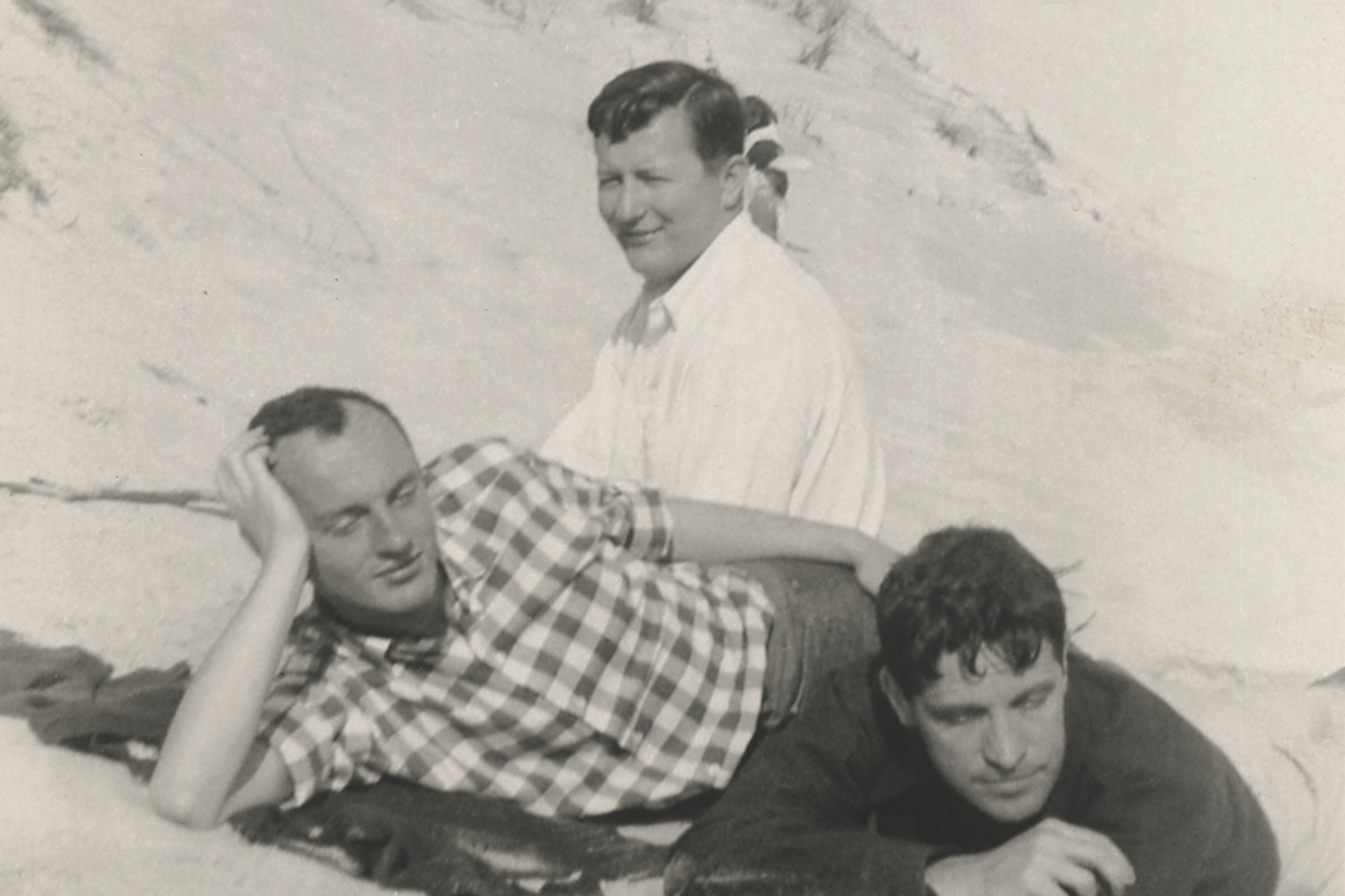A Grand Party

Near midnight, Labor Day weekend, 1949: 22-year-old John Ashbery holds court at his crowded basement sublet in Greenwich Village while the guest of honor, Frank O’Hara, sails confidently by, wearing a brightly colored scarf he has just acquired from somewhere in the apartment. It is the first party John has ever thrown in New York City. About 70 people, everyone a writer, painter, or musician living nearby, spill onto the sidewalk, drinks in hand, talking loudly, taking advantage of one of the last warm weekends of the year. Their restless, dancing feet are the only part of their bodies visible from the street-level window inside. The packed apartment is hot and loud. A beautiful young musician John has never met, who arrived a few hours before on the arm of a former Harvard classmate, performs Francis Poulenc’s “Perpetual Motion” brilliantly but also repeatedly on the piano. After an hour of nonstop playing, she collapses, exhausted, on the couch where John sits listening. She stares at him. John glances her way with a wry expression she reads as anxious. “It will be all right,” she suggests helpfully.
John isn’t depressed, though, not tonight, at least; he’s amused. Everyone he has met in the city and liked, and almost everyone he has wanted to meet or hoped not to meet again, have all come to his party. The mixture of attractive and plain, shady and sincere, men and women, gay and straight, drunk and sober, extroverted and shy, promising and successful, produces a strange and shifting mosaic inside his apartment.
It is well past midnight, and more people arrive. John has already had a good conversation with the poet Jean Garrigue, whose poems he has admired in Oscar Williams’s anthologies since high school, and enjoyed talking with Emma Swan, a plain but poetically named woman, whose first book of poems is about to come out from New Directions. Both are very encouraging and say they like his poems. Emma and Jean, older than nearly everyone else, talk to each other seriously in a corner, and seem to be enjoying themselves. John sees the even older poet José Garcia Villa, W. H. Auden’s contemporary (and one of the shadier characters at the party), walk outside. John cannot remember where they met during the two months he has so far lived in New York City, and he has seen Villa only once since then. He is curious to know how the poet even heard about the party.
John gets off the couch in search of friends. Six feet tall and extremely thin, he is wearing his nicest sharkskin suit and tie, only slightly wrinkled from his sitting so long. He finds Jane Freilicher, who has become his closest friend in the city, talking animatedly with Frank O’Hara. Frank is asking her questions about her paintings with charming intensity. He has just returned from a jaunt to the Phoenix Book Shop, around the corner, on Cornelia Street, and John is eager to hear what Frank thinks of the place. The Phoenix has become John’s new late-night haunt since his moving to Jones Street, for the bookshop stays open until well after midnight and is a gathering place for artists. He wonders who is running the shop right now, since the entire staff appears to be at his party. The owners, Adam and Virginia Margoshes, are drinking with John Lynch, a salesman, and talking to Ann Truxell, a painter with a charmingly foul mouth, who hangs out all the time at their store. Lately, Ashbery has been painting abstracts with her for fun, in a back room of the bookshop, which she helped set up as a studio. Painting is something John hasn’t done seriously since high school, and the absorbing activity almost makes up for the fact that he hasn’t written a single new poem since moving to the city. How could he? He has already changed apartments three times, worked a full-time job at the Brooklyn Public Library, applied to graduate school, and visited nearly every bar on Eighth Street.
Thinking about not writing depresses him, though, so he goes to talk with Jane and Frank. They have clearly hit it off, which pleases him. Introducing Frank to his New York friends, and vice versa, is the whole point of the party. It is too bad that his two good friends, the poet Kenneth Koch, who only briefly met Frank while they were together at Harvard, and Jane’s boyfriend, Larry Rivers, an excitable and exciting painter studying with Hans Hofmann, are out of town this weekend. John is sure that they will find Frank as celestial as he does. If it weren’t for Frank, who materialized at Harvard just weeks before John graduated the previous June, his senior year would have been anticlimactic. During the last month of school they spent every day together, and John emerged from that intensely happy period thinking he had met not just a brother, but very nearly his “identical twin.” Frank and John do not look alike, but their flat, nasal accents—Frank comes from Grafton, Massachusetts, and John from far upstate New York—and even their off-the-cuff comments sound remarkably similar. Having served in the war, Frank is a year behind John at Harvard, but a little over a year older, and they regularly take turns in the role of the older, more experienced brother. John is proud to show Frank off to his new friends, and equally proud to show off his New York City life to Frank, who has traveled to the city to be with him, despite a beastly cold. Seeing Frank and Jane together, though, already so close, John wonders briefly if these introductions might be working too well.
He returns to the couch. The writer Pat Hoey and her current boyfriend, the painter Al Kresch, sit down next to John. Pat thinks John is a genius and, at every opportunity, tries to get him to talk to her about poetry. She asks him a lot of questions, which he answers patiently. She asks him to write a poem; a piece of paper is obtained, and he obliges. Pat thinks the poem is the best thing she has ever read, but it gets lost almost immediately after he writes it. Frank sails back into the room and tells John an amusing story of what happened during his walk to the Phoenix Book Shop. The story seems to involve a young mother, her young son, and Frank’s eye-catching scarf, but John isn’t listening carefully, and the spirit rather than the details of the story penetrates his consciousness.
Al, however, listens closely to Frank’s tale. He has never before met anyone with Frank’s social charm, and he wonders if John, whom he likes very much, feels jealous at how quickly Frank has won everybody over. John is elated that Frank is having such a good time at the party. Pat mentions that the poet Allen Ginsberg is outside in a suit and tie, regaling several people with his thoughts about poetry. Someone wonders aloud if this is possible, for Allen is apparently under house arrest uptown. Later, when John goes outside, Ginsberg isn’t there. He also looks for the poet Delmore Schwartz, whom he is told is talking outside with other members of the Partisan Review staff, but he cannot find him anywhere.
It is after two in the morning, and the party is slowing down. Jane Freilicher tells John she is leaving. She kisses Frank good-bye. It is un- like her to be so positive, but she thinks Frank is “a special breed . . . so charming.” John usually likes her ability to zero in on any strange or awkward behavior and skewer it. She often says what he is thinking but is too polite to say aloud. She doesn’t do that now; she is in too good a mood. It is disconcerting. She tells him he has thrown a grand party. He has merely tried to throw a decent party, but he is glad it has gone off so well. He begins to think of it as “my grand party.” The party is nothing like the already-famous event Robert Motherwell presided over in Provincetown a few weeks earlier. All the New York abstract expressionist painters were there, and Motherwell declared that together they made up a New York School of painters. The stories already circulating about Motherwell’s speech make his pronouncement sound very serious and auspicious. John is satisfied that his casual party of paper cups and cheap beer, Poulenc and late-night visits to bookshops, is nothing like that. He is equally pleased that he is in New York City, which is clearly the place to be for an artist at this moment, the city that John has felt certain he should live in, ever since he was a young boy on his family’s upstate New York farm.
The party is over. As John and Frank climb into his twin bed, intimate but never romantic for them, dawn appears aboveground. In the agreeably dark and cool underground room, still delightfully buzzed from the evening’s frivolities, they go to sleep.
Images from John Ashbery’s private collections copyright © 2017 John Ashbery. All Rights Reserved. Used by arrangement with Georges Borchardt, Inc. for the author.
Excerpted from The Songs We Know Best: John Ashbery’s Early Life by Karin Roffman. Published by Farrar, Straus and Giroux. Copyright © 2017 by Karin Roffman. All rights reserved.
-
Related Authors
-
Related Collections
- See All Related Content


